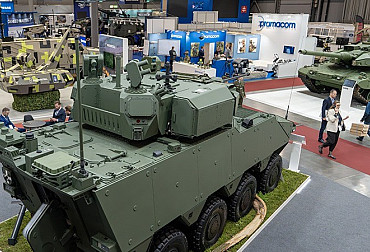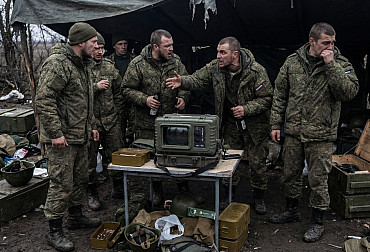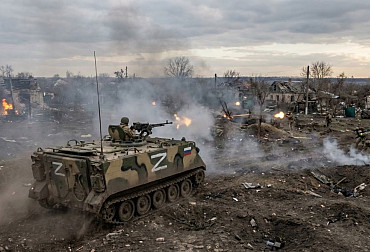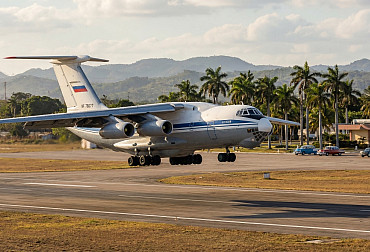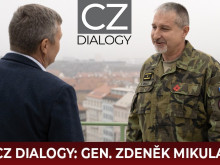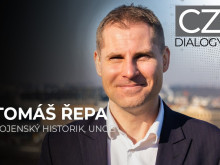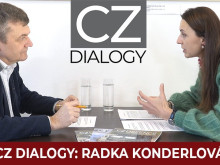Vasyl Zvarych: Russia owes us $350 billion for its war of aggression
Since the beginning of Russian aggression, the Czech Republic has stood firmly on the side of Ukraine – not only politically and militarily, but also in humanitarian terms. At the same time, like other countries that are helping, we are targeted by Russian propaganda. In an interview with Ukrainian Ambassador Vasyl Zvarych, we talked about the specific assistance provided by Czechia, the current situation on the front lines, and how Ukrainians who have found a new home in our country are doing.
Video: Interview with Ukrainian Ambassador Vasyl Zvarych / CZ DEFENCE
Mr. Ambassador, how much do you think the Czech public really knows about the war in Ukraine?
I believe that the Czech public is very well informed about events in Ukraine, thanks to the work of the media, journalists, and volunteers who often travel to Ukraine and see what is really happening there, and also thanks to politicians who visit Ukraine. It is very positive that the Czech public is showing increased interest in the situation in Ukraine. We can see from recent sociological surveys that this interest has been growing since the beginning of the year. It is extremely important to know the true picture of Russian aggression against Ukraine so that people do not fall victim to Russian propaganda. We know how brutally this propaganda works and how it exploits every opportunity to spread division, including within Czech society. That is why it is very important not only to be informed, but also to remain engaged. Indifference is the greatest evil. However, Czech society is not indifferent, which is closely related to the historical experience of the Czech nation itself, having lived under Soviet occupation, which has seen Russian tanks in its streets, and which is familiar with the concept of the Munich betrayal of 1938. It is precisely this engagement and ability to recognize the dangers of totalitarianism that is the strength of the Czech nation—and for that we are extremely grateful.
You mentioned propaganda. Can you give some examples of Russian propaganda in our country?
For example, a very common argument we hear is that all the problems Czech society has today are caused by Ukraine. But the real question is not whether Ukraine – by defending itself – is causing problems for Czech society. The problem is that Russia has attacked Ukraine, and Ukraine has every right – in accordance with the UN Charter – to defend itself by all means available.
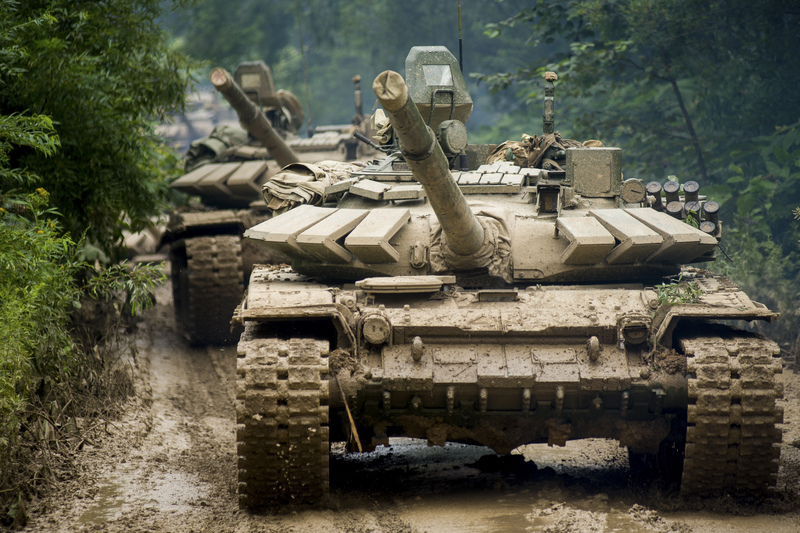
What's more, if Ukraine were to suddenly lose this war and Russia were to approach the borders of the Czech Republic, the Czech nation would face much greater threats and would also have to spend much more money, including on defense. Another striking example of Russian propaganda is the widespread narrative that the Czech authorities are currently helping Ukrainians more than their own citizens. This is complete nonsense, because all the statistics say the opposite. The presence of hundreds of thousands of Ukrainians in the Czech Republic is not a burden on the Czech budget—on the contrary. Ukrainians work here, pay taxes, and thus contribute not only to the state budget, but also, for example, to social benefits and pension reform, which also benefits Czech citizens. These are very clear examples of manipulative claims that are being spread, directly or indirectly, by the Russian Federation in order to sow discord and mistrust in Czech society through various methods.
What are the main challenges Ukraine currently faces in the context of Russian aggression?
As you can see, Vladimir Putin's goals have unfortunately not changed – he is still seeking to destroy Ukraine as an independent state. What is even more serious is that he is trying to revive the Soviet Union in essence, with all its spheres of influence. And no one is even hiding these spheres of influence. We can see that they include not only Ukraine, but also parts of the Czech Republic and other countries of the former Warsaw Pact. This is our main problem and challenge today – how to effectively counter this pressure. Recently, we have seen an increase in air strikes on various Ukrainian infrastructure facilities, including residential buildings. Innocent civilians are dying. This means that Russia is deliberately terrorizing the Ukrainian population in order to cause panic, dissatisfaction with the government's actions, and so on. Therefore, it is crucial for us to do everything we can to protect Ukrainian airspace. We need support in the area of air defense, both in terms of resources and systems. The second major challenge for us is to increase pressure on the Russian Federation, particularly through sanctions and political isolation. Russia must feel the real cost of the war it has unleashed against Ukraine. This is also a complication for us, as we see how the approval of the 18th package of sanctions within the European Union is being delayed. We are watching this with concern, but we believe that common sense will prevail in the end. Because Russia will not stop on its own – we must stop it with joint forces, including pressure through sanctions.
You are a diplomat, but I would like to ask you for your personal opinion on Ukraine's military strategy. Also, will the length of this war bring about any changes in the system of warfare?
It is clear that changes have taken place, and we can already see that the current military strategy is adapted to the current reality. Indeed, while we used to see greater mobility, dynamism, and rapid and extensive offensives, today everything is taking place within the framework of positional warfare. An important element of Ukraine's military strategy is the maximum destruction of the Russian Federation's resource base, which enables it to continue waging war and killing our citizens. For this reason, the entire army and the political and military leadership of Ukraine are now focused on destroying logistics and command centers and all infrastructure routes that enable the Russian army to be supplied with the necessary equipment. We understand that only by destroying this resource base will we deprive Russia of the ability to carry out more extensive offensives on other parts of Ukrainian territory. The second important aspect of Ukraine's military strategy is its emphasis on high-tech warfare. This means radio-electronic warfare, the use of artificial intelligence, the synchronization of our intelligence capabilities with the intelligence systems of Western countries, and so on. We therefore place the main emphasis on technologically advanced areas. We are well aware that Russia unfortunately surpasses Ukraine in terms of manpower and military equipment, but it does not surpass us in terms of quality. That is why a key element of our military strategy is also an emphasis on quality, technology, and the maximum limitation and destruction of the enemy's resource base.
However, the nature of the war in Ukraine has changed over the years. This year, it is proceeding somewhat differently than in previous years. Some experts even speak of trench warfare, almost as it was during World War I. What further developments can be expected?
Those who say that the way war is waged has changed are indeed right. Today, war is hybrid in nature. We are partly returning to the days of World War I in terms of building fortifications, concrete fortifications, and extensive networks of trenches. On the other hand, this hybrid form of warfare relies much more on the use of modern technology. Currently, drone combat is gradually beginning to replace classic artillery combat. We are seeing huge amounts of resources being invested in these modern technologies. And here I would like to say that Ukraine has made significant progress in this area. We have high-quality domestic production of modern drones, including long-range drones. Thanks to them, we are able to strike key infrastructure targets of the Russian army, and we will continue to do so. The current method of warfare is therefore truly trench warfare, as we do not see any major breakthroughs or large-scale offensives on the part of the Russian army. The war is being fought not for kilometers, but for every single meter, and each of these meters costs Russia enormous losses. The fact that Ukraine is making extensive use of drones is a major innovation compared to previous conflicts. And we can see how effective this method of combat is. At the same time, electronic warfare is a very important area, as is the use of artificial intelligence, which today plays a very active role on the battlefield.
Ukraine is a large country. Is it possible to describe how this war is perceived in western and eastern Ukraine?
Ukraine is currently at war as a whole. You can see for yourself—just a few days ago, Russian drones and missiles struck Chernivtsi, one of the westernmost parts of the country. Two civilians were killed there. This means that the feeling of war is present throughout Ukraine, regardless of region. In addition, we must realize that six million internally displaced Ukrainians now live in the west, central, and south of the country. These are people who have lost their homes, whose dwellings have been destroyed. However, they have also brought their emotions and pain with them, so these areas are also experiencing war today. The whole of Ukraine lives in the hope of victory. We all long for victory to come as soon as possible, and every Ukrainian feels responsible in this struggle. That is why I do not see a difference between eastern and western Ukraine in their perception of the war—we all want peace. But a just peace, not peace at any price. Because we want our future generations not to have to die for the freedom and independence of Ukraine, as our current heroes are dying today.
How do you assess the assistance provided to Ukraine by the Czech Republic, whether military, political, or humanitarian?
What the Czech Republic is doing is a tremendous example for many countries around the world. And I wouldn't limit that to Europe alone. It is truly an extraordinary helping hand extended to Ukraine – and we are immensely grateful for it. This assistance is not only coming from the state, but also from many non-governmental organizations. We can see how strongly motivated Czech society is to continue helping Ukraine. On the other hand, I realize that the word “help” can evoke conflicting reactions among some groups in Czech society and among politicians. That is why I want to emphasize that Czech aid to Ukraine is not charity, it is not alms. It is an investment – including in the security of the Czech nation itself. The longer we manage to keep Russia as far away from the Czech Republic's borders as possible, the more time your country will have to strengthen its defenses, modernize its army, and prepare for new challenges. This is not just about conventional warfare – we are also talking about hybrid threats, sabotage, and diversionary activities that are already taking place in the Czech Republic. You have all surely read the latest annual report of the BIS, which clearly states that the Russian enemy is already here and is already causing damage. We must be truly cautious and prepared according to the principle: “If you want peace, prepare for war.” And it is precisely this time that the Czech Republic is being given by Ukrainian soldiers, who are holding back the enemy with their own lives. And everyone in Czechia should realize that this is not aid in the sense of “giving something of our own,” but a mutually beneficial partnership. Aid in the form of arms supplies is not free, after all.
The Czech ammunition initiative, for which we are very grateful, is not only helping Ukraine, but also supporting Czech manufacturers, the Czech defense industry, Czech jobs, taxes, and the social system. Everything is interconnected. Thanks to the fact that the Czech Republic supplied Ukraine with weapons in a timely manner, it also gained the opportunity to modernize its own army thanks to compensation from the European Union. Not to mention the Ukraine Facility, from which the Czech Republic also draws funds, including those from frozen assets of the Russian Federation. Czechia can use this money to purchase more ammunition—which is again produced in the Czech Republic, so the money stays at home. That is why it is important to distinguish between aid and partnership. What is happening today between Czechia and Ukraine is not one-sided aid – it is cooperation based on mutual benefits. And even ordinary Ukrainians who have found work here often work below their qualifications, but they are motivated and committed. Through their work, they contribute to the Czech budget, the housing market, employment, healthcare, and the social system. So even the presence of Ukrainians in Czechia is not charity, but the creation of an opportunity that Ukrainians can turn to their advantage and that of the country in which they live and work.
Is there any sector or area where we could provide even more significant assistance?
We urgently need to obtain the necessary ammunition as quickly as possible. And it is precisely in this area that the Czech Republic is really showing results. Over the past year, thanks to the Czech Republic's leading role, we have received 1.5 million pieces of large-caliber artillery ammunition – not only 155 mm, but also 122 mm, smaller calibers, and even larger ones, such as 203 mm. This year, we expect an even larger volume – 1.8 million pieces of ammunition. However, the most important thing is not just the numbers, but the pace of deliveries. Every Ukrainian soldier needs to be sure and have a guarantee that the ammunition will arrive on time. Unfortunately, delayed deliveries – even if only by a short time – often mean the loss of our soldiers' lives. For this reason, we would like to ask not only the Czech Republic, but also all our partners, to make every effort to deliver ammunition to Ukraine as quickly as possible. The second key point is to strengthen the air defense system.
We understand that the Czech Republic does not have Patriot systems, but it has other capabilities and options to help strengthen our air defense. And it is precisely in this area that Czechia can play an important role, including cooperation within the international coalition. The third area where I would first like to express my gratitude and at the same time call for expanded cooperation is the training of our soldiers. I would like to thank the Czech government for its recent decision to allow Ukrainian pilots to train on L-39 training aircraft here in the Czech Republic. This is a very important step. Our presidents have also agreed that a training center for F-16 pilots will be established in Czechia in the future. We know that the Czech Republic has the necessary and developed infrastructure for such a project. And we hope that this training facility will be established as soon as possible. We are fully aware of how important the speed and dynamics of this process are – because it is the pace that determines lives.
Do people in Ukraine have a chance to perceive that this aid is coming from Czechia? Or rather, what is their attitude towards Czech aid?
Great. You see, one of the positive effects of this aid is the high level of sympathy that Ukrainian society has towards the citizens of the Czech Republic. And whenever Ukrainians hear that you are Czech, believe me, you will be met with the utmost warmth and appreciation. There have been many examples – sometimes amusing – when, for example, a Ukrainian refused to accept payment in a supermarket after finding out that you were Czech, and as a token of gratitude said: “No, no, please don’t pay for this, it’s from us to you.”
What role does NATO play in the conflict in Ukraine? In your opinion, does the Alliance provide sufficient support to Ukraine?
It is important to note that NATO as an organization does not directly supply weapons to Ukraine. Weapons are provided by individual Alliance member states. However, NATO plays an important coordinating, logistical, and informational role, and we greatly appreciate this support—not to mention certain financial aspects, but also the training of our soldiers according to NATO standards. Today, we are incorporating all NATO standards into the training system of our armed forces, which is extremely important to us. So NATO does indeed play an important role. At the same time, however, we must make a clear distinction, because Russian propaganda is spreading the narrative among its citizens that Putin and Russia are at war with NATO. This is not true, because NATO is not a party to the conflict and does not provide weapons directly to Ukraine. But the logistical, support, and other forms of assistance from the Alliance are very valuable to our soldiers, and we are truly grateful for them. We also believe that we will be able to repay this support by becoming a full member of the Alliance in the future, which is where Ukraine is heading and where it will undoubtedly join. Today, the Ukrainian army is the most prepared army according to NATO standards, but at the same time it is also the most experienced army in the field of conducting actual combat operations. And I believe that this will benefit the entire transatlantic security architecture, the whole of NATO – not to mention other potential opportunities for business development, innovation, and cooperation that will also be significant for our partners within the Alliance.
As we mentioned in our interview, in addition to traditional weapons, completely new technologies are also appearing on the Ukrainian battlefield. How do you think Ukraine is doing in terms of effectively using technological developments for its defense?
I think that Ukraine is setting a very good example to the whole world of how a country can effectively use its resources in wartime and place greater emphasis on quality and technological development than on manpower alone. We are doing everything we can to protect the lives of our soldiers, including the wider use of modern technologies, drones, radio-electronic warfare systems, artificial intelligence, intelligence data, satellite communications, and many other means. All of these tools are crucial for us. When it comes to drone production, Ukraine is now capable of producing virtually the same amount as Russia, while consuming fewer resources. However, it is essential that investment flows into this area, especially in the development of modern defense technologies. We have the potential to localize production directly in Ukraine, which will reduce costs, for example, in logistics. We are completely open to international cooperation. We have a functioning investment program called "Zbrojerij," which is aimed at involving foreign capital in the development of the Ukrainian defense industry. This tool is already being actively used by Denmark, other European Union countries, and partners outside the EU. I believe that Ukraine is showing a very positive trend in this area and is now one of the most technologically advanced countries in the world in the field of defense.
Let's move on to politics. How intense do you think Ukraine's efforts to integrate into the EU and NATO structures are?
This is our conscious choice, from which we will never retreat. This is precisely what Ukraine is fighting and shedding blood for – our future in the European Union and NATO. This is our direction, a conscious decision to completely detach ourselves from the so-called "Russian world" and the Soviet past. We see our future in the European Union and we are ready to go through this process very quickly. We have already successfully completed the screening process and are ready to open negotiation chapters (clusters) as part of the EU accession process. Unfortunately, there are some countries that are blocking the full launch of negotiations, but I believe it is only a matter of time. Everyone must realize that Ukraine's membership in the EU will be an asset, not a burden. We are extremely open to cooperation and have enormous potential to develop it, including in areas such as agriculture, information technology, infrastructure, logistics, and, of course, the defense industry, where Ukraine is rapidly becoming one of the leaders.
How do you perceive the social and economic situation of Ukrainians in the Czech Republic and other EU countries?
Today, there are approximately 380,000 Ukrainians living in the Czech Republic who have been granted temporary protection status. That is a large number, and the Czech Republic is the country with the highest number of Ukrainians per capita in Europe. This is very significant assistance, and we are extremely grateful that the Czech government and citizens have opened their hearts and homes to Ukrainians who really needed this help. But at the same time, it is very important to emphasize that 70% of Ukrainians of working age work here legally, pay taxes, social security contributions, and health insurance—and thus express their gratitude to the Czech Republic. They did not come here to sit idly and draw social benefits. They came here to acquire new skills, work, and help their Czech friends and partners develop the Czech economy. I believe that the level of integration of the Ukrainian community is very high, and I am grateful for that – because it is thanks to the government, the president, and the parliament of the Czech Republic. But above all, it is thanks to ordinary Czechs who understand that Ukrainians are part of society here and who help in various ways to deepen and improve integration.
On the other hand, not everything is rosy, and Ukrainians face problems here too. Can you specify these problems in more detail?
We are aware of several specific challenges that Ukrainians face here. Of course, these challenges do not overshadow all the positive attitudes and support they experience here, but there are still issues that we are currently working on with our Czech partners in the government. One of them is expanding the options for certification centers for taking the Czech language exam at the C1 level. This is very important because Ukrainians are ready to learn Czech. Many already have a very good command of the language. However, in order to obtain employment in certain professions, such as school teachers, they must pass a C1 level exam. They are ready for this, but unfortunately, the capacity of these certification centers is very limited. If their capacity could be expanded, it would be a huge benefit for everyone. The second issue that we often deal with as an embassy concerns the possibility of Ukrainian doctors using the title "MUDr." Unfortunately, current Czech legislation does not allow this. At the same time, however, we consider this situation to be a form of discrimination – not only against doctors, but also against Czech patients. If a highly qualified Ukrainian doctor without the title "MUDr." works in a hospital, Czech patients often refuse his care simply because of the absence of the title – even if there is no other alternative. Thus, patients consciously deprive themselves of necessary medical care, while doctors are restricted in the full exercise of their profession. That is why we are now working to ensure that Ukrainian doctors who have undergone the complex process of licensing exams in Czechia are given the opportunity to use the title "MUDr." This would send a strong and positive signal to Czech patients who expect quality healthcare and want to trust professionals – regardless of where they come from.
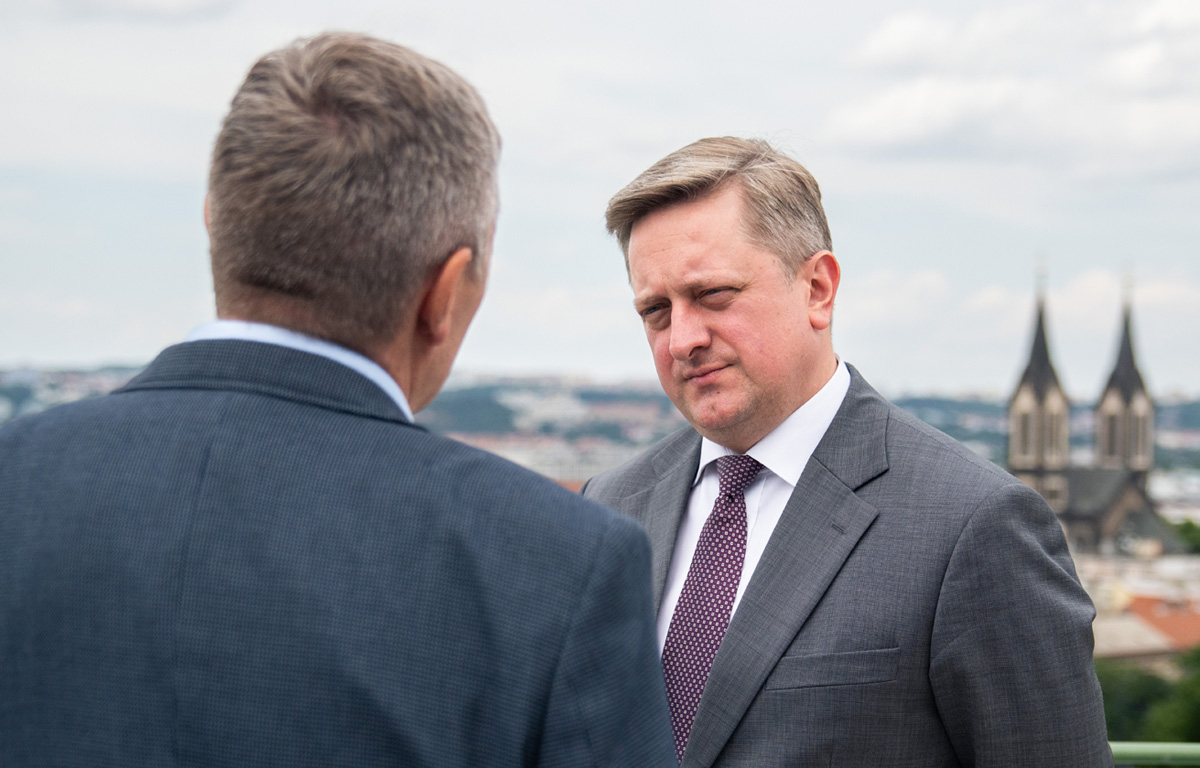
Unfortunately, Ukrainian soldiers are returning from the battlefield not only with physical injuries but also with psychological injuries, such as post-traumatic stress disorder, which is now a major issue. Civilians are also suffering from long-term psychological trauma. How do you perceive this problem?
This is a very serious problem. It is no secret that children in particular are having a difficult time. I see this in my own children. We spent the first days of the war in Kyiv, and the children woke up to the sound of explosions. It is a huge problem. Our government is fully aware of this. The president, the government, and state institutions are working on it. The National Mental Health Program has been in place in Ukraine since 2022. Various programs are being prepared at the level of the Ministry of Health. Everything is under the auspices of the First Lady of Ukraine, Olena Zelenska, who is making enormous efforts to support the mental health of Ukrainians. We are exchanging experiences with our partners, cooperating with the World Health Organization in this area, and also cooperating with Czech clinics. In May, memoranda were signed between the Ukrainian Mental Health Center and the Czech center. So it is a big problem, but if we combine our efforts correctly and make the right diagnoses, we will gradually overcome it. However, it is not easy and it is certainly not a matter of a single day. It is very demanding and long-term work, which must include both those who have suffered psychological trauma as a result of the war and those who will continue to work with them.
What do you think is the role of the Ukrainian diaspora abroad – do they contribute to the restoration and development of Ukraine even during the war?
It is a significant force. We know that the Ukrainian diaspora numbers approximately 20 million people, which is certainly not a small number. It is a powerful lobbying force in various countries around the world. We have carried out a structural reform of the Ministry of Foreign Affairs and created a separate department – the Department of Global Ukrainian Affairs. In doing so, we want to reemphasize how much attention our state pays to the Ukrainian diaspora. We are introducing a mechanism for multiple citizenship. We are giving our compatriots abroad who have never been citizens of Ukraine because they were born in another country and have its citizenship the opportunity to obtain Ukrainian citizenship through a simplified procedure – so that they feel an even stronger sense of belonging and are more motivated to work with us to achieve victory for Ukraine. We greatly value the Ukrainian diaspora, support it as much as possible, and at the same time expect its help – political, financial, and educational. This is a very important dimension that we are actively working on.
After the war ends, a lot of people and effort will be needed to rebuild Ukraine. Do you think that Ukrainian citizens will return home or support their country from abroad, for example from the Czech Republic?
It all depends on how well we – Ukraine and the entire international community – manage to create the right conditions for the effective post-war reconstruction of Ukraine. And there will be countless opportunities to return. We saw how successful the Ukraine Recovery Conference (URC) in Rome was. A large number of agreements and memoranda were signed, with a total value of over €11 billion. These are huge investments and projects that will gradually rebuild various sectors in Ukraine. Of course, we need manpower and bright minds. Investing in human capital is one of the key directions for Ukraine's recovery. Once these smart and capable people—and there are many such Ukrainians around the world—feel that they can fulfill themselves in Ukraine and be of benefit to their homeland, I am sure they will return. Because for them, it will not only be a matter of honor, but also an opportunity to truly fulfill their own potential. And despite all the difficulties, it is easier to do this at home. We will work on it.
How can the international community help with the reconstruction of Ukraine, not only economically, but also socially and institutionally?
I can give a very good example—it is the initiative of the President of the Czech Republic regarding the Marshall Plan for Ukraine, which Czech President Petr Pavel presented in Rome. It consists of 11 points that are of enormous importance for Ukraine: coordination of this aid, its consolidation, so that everything does not proceed chaotically. This will be an additional incentive for Ukrainians, who will make the decision to return thanks to this prospect. It is an important project. The Ukrainian government already has its own recovery strategy. We understand that reconstruction is not just about repairing hospitals or schools. It is about a profound transformation of the entire country. Even the reconstruction of infrastructure itself will be carried out according to the "Built back better" strategy – that is, rebuilding, but better, in accordance with current standards. Western aid will be necessary, but we reiterate that this is not charity, but partnership. This is evidenced by the dozens of agreements signed in Rome, with more to follow. We also strongly urge the international community to take a more decisive approach to the use of frozen Russian assets. We believe that we have the right to use not only the proceeds from these assets, as is currently the case, but also the assets themselves. This amounts to $350 billion, which is what Russia owes us for its aggression. We have the right to use it to rebuild what Russia has destroyed. To achieve this goal, the consolidation of the international community is absolutely essential.











